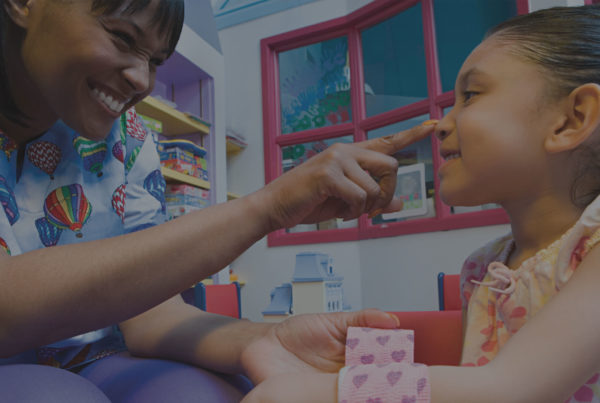No family starts their day thinking, Let’s visit the pediatric emergency department today! And even in situations when a healthcare appointment is scheduled in advance, or when hospitalization is expected for well care or management of a chronic illness, any trip to the doctor can be an anxiety-provoking experience. Children anticipate painful experiences, while parents are concerned about updates from the medical team; this is in addition to the variety of stressors for the family in dealing with management of chronic illness or hospitalization.
In children’s hospitals, large pediatric centers, community settings and affiliated outpatient pediatric centers across the country, an ally for families is present and ready to provide support. Child Life Specialists are certified healthcare professionals who guide families through healthcare experiences and challenges. As stated by the Association for Child Life Professionals (www.childlife.org):
We, as child life professionals, help infants, children, youth, and families cope with the stress and uncertainty of illness, injury and treatment. We provide evidence-based, developmentally appropriate interventions including therapeutic play, preparation and education to reduce fear, anxiety and pain.
History of the Profession
Dating back to the 1920s, child life services were developed to improve healthcare experiences for children by providing play, preparation, and educational programs. These child-centered services were deemed necessary to assure the emotional stability and healthy development of hospitalized children and to mitigate the fear and pain associated with their medical treatment. Often at this time, children were hospitalized for extended periods with restricted visitation from family. The child life specialist became an early and ardent advocate of frequent family visits and parental participation in the care of their child. This progressive philosophy was the precursor of family-centered care.
In 1965, the Association for the Care of Children in Hospitals(later named Association for the Care of Children’s Health) was formed. The goal of the organization was to create child and family-friendly hospital environments. From this organization, the Child Life Councilwas formed. In the 1970s, the group defined the theoretical basis for child life work, the essential elements of the professional practice, and the goals of educational programs to prepare students. In 2016 the Child Life Council re-branded and became the Association of Child Life Professionals.
Today there are more than 400 child life programs in North America, and child life programs operate in Europe, Middle East, Asia, Africa and Central America as well.
American Academy of Pediatrics Support
According to the American Academy of Pediatrics, the provision of child life services is a quality benchmark of an integrated child health delivery system, and an indicator of excellence in pediatric care. Child life programs and the kind of services provided are considered an essential component of family-centered care. An experimental evaluation of a child life program model showed that child life interventions resulted in less emotional distress, better overall coping during the hospital stay, a clearer understanding of procedures, and a more positive physical recovery and post-hospital adjustment for children enrolled in the program. In addition, patients spent less time on narcotics, the length of stay was slightly reduced, and parents were more satisfied. Other studies have found that child life interventions calmed children’s fears and resulted in higher parent satisfaction ratings of the entire care experience.
Child Life in action in New York
At NewYork-Presbyterian Komansky Children’s Hospital in Manhattan, a dedicated team of 25 child life specialists, creative arts therapists, teachers and child life assistants work in a variety of inpatient and outpatient pediatric settings – including:
- General pediatrics
- Pediatric intensive care unit
- Pediatric stepdown unit
- Neonatal intensive care unit
- Burn intensive care unit
- Perioperative surgery
- Pediatric procedures
- Pediatric hematology/oncology
- Pediatric outpatient services
- Pediatric radiology
- Neurological surgery
- Pediatric emergency department
By forming a relationship with a child or adolescent, we explore his/her understanding of the reason for his/her healthcare visit, talk about upcoming procedures when necessary, and utilize play for teaching, expression, and (most importantly) fun!
As members of the interdisciplinary team, child life specialists bring a unique child development perspective to help in treatment planning and facilitation of healthy coping. Research shows that children cope best when information is presented in a timely manner and is developmentally appropriate to allow for questions and understanding. We often take challenging information and help children to understand it through a playful, educational lens.
For example, we may use a doll to teach about a device a child will need or to demonstrate how a child can anticipate to wake up after a surgery, where bandages will be or if a urinary catheter is needed. We teach children tricks on how to swallow pills and how to anticipate side effects. Once education has been provided, a child life specialist will then explore coping skills and ensure a plan is made to best support a child and family for the upcoming procedure or outcome.
Child life specialists supplement a parent’s expertise on his/her child with the knowledge of healthcare experiences. Hospitals are often described as “foreign countries,” as staff wear uniforms, speak a “different language” and have specific routines that are expected to be followed. It is one of the few environments that a parent does not have full control over his/her child. Child life specialists honor the unique challenges that illness, injury and treatment can present, and we are equipped to support the developmental, educational, emotional and recreational needs of pediatric patients and their families.
Future of the Field
As the scope of the child life profession continues to grow, many specialists are striving to make child life services a standard of care in all medical environments involving children. It is now very common in large academic teaching hospitals to have child life staff who also support children of adult patients.
Often child life specialists are consulted to support families on how to talk with children about a parent or loved one that is critically ill or dying. Child life specialists have the expertise to provide guidance on developmentally appropriate language, choices and ways to support children during such a difficult time. Specialists will also facilitate a bedside visit, building in time for family to be together in saying goodbye.
In addition to medical environments, many child life specialists now work in non-profit support centers for bereavement or coping with chronic illness as well as agencies that support “wish making,” specialty camps, quality of life and foster care placement.






